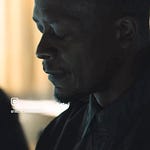It was winter, nearly a year after my father passed—after a decade-long battle with kidney disease and a host of illnesses that decimated his body. He had fought long and hard, lived far longer than the doctors predicted. He was the father of eight children by one mother, one wife. A man of faith—bold, daring, hardworking. He was also a man of the cloth. The kind rarely talked about. The kind who would get in the trenches, meet people where they are, feed, clothe, counsel. He was never rich. Never had a mega church, or even a building. It was squarely about helping people.
Before he was a preacher, he worked in mental health and did the same—helped folks lost in the system, lost in their own minds. He wasn’t perfect, but he was the genuine article.
So when he died, I was disoriented—emotionally, mentally, spiritually. So much didn’t make sense. At some point, overwhelmed with raw sorrow, I guess I dissociated. Like my emotions tripped the breaker and turned the whole house off.
I tell some of this story in The Suspended Chord.
So I sat in the dark. Not even my lifelong sanctuary—the sanctum that is art—had light. It was cold, and dark. But I knew that if my art died, so would I. So every day, I committed to sitting for at least an hour in front of my computer or with my journals open—and wait. If I wrote even a dot, it was a victory. But for months, it was nothing.
Whenever I thought about writing, my mind would get logjammed with questions, and then—snap—whatever spark was flailing to come alive would blink out.
Until one evening, instead of switching off, the dammed-up, repressed energy couldn't be contained. My brain broke a little, and all I had were questions. The thing that triggered it was this thought: I remember Dad at my age.
I was old enough to have connected with my father as another man—not just a son, not just a child. But now, when I needed to ask him the most profound questions of manhood, he was gone. That thought broke me in a way that was impossible to articulate—with words.
It was such an overstimulating sensation (I’ve never felt anything so intense, aside from the actual day he died) that, to keep from breaking into tears in the middle of a Starbucks, I wrote furiously. Every question. Every anxiety. Everything.
And that became a story. Not mine, because I needed some distance from the narrative. It felt safer that way.
The protagonist of the film didn’t know his father. I knew mine. But for a long time, my father didn’t know his. The story became a mix of my mother’s relationship with her father and my dad’s relationship with his… all blended together.
It was a year later that I made the film, and a few months after that, it premiered in a theater.
After the screening, a woman walked up to me in tears and said, “This film articulated what my son tries to express but doesn’t know how.”
As a writer and director, that was the most fulfilling moment. It was both the comfort of not feeling alone in this kind of sorrow, and the affirmation that my art was fulfilling the most sacred function of art: articulating the experience, the feeling, the existence of those who may not know how.
And that’s just part of the story of In Absence.
Please watch the full film—and let’s chat.













Share this post